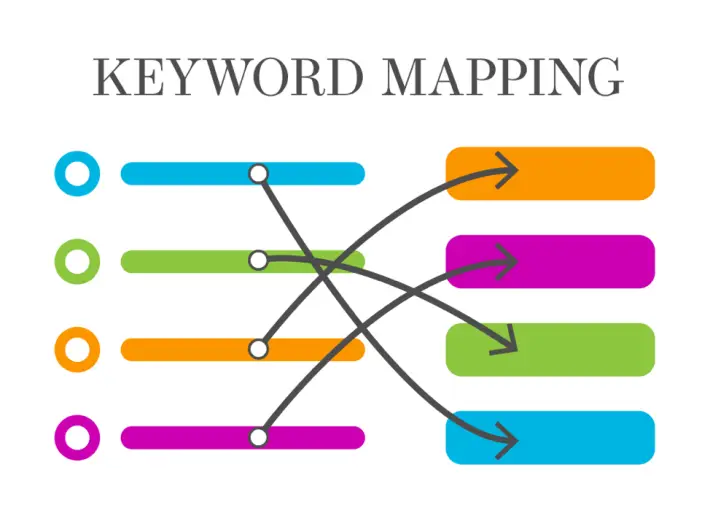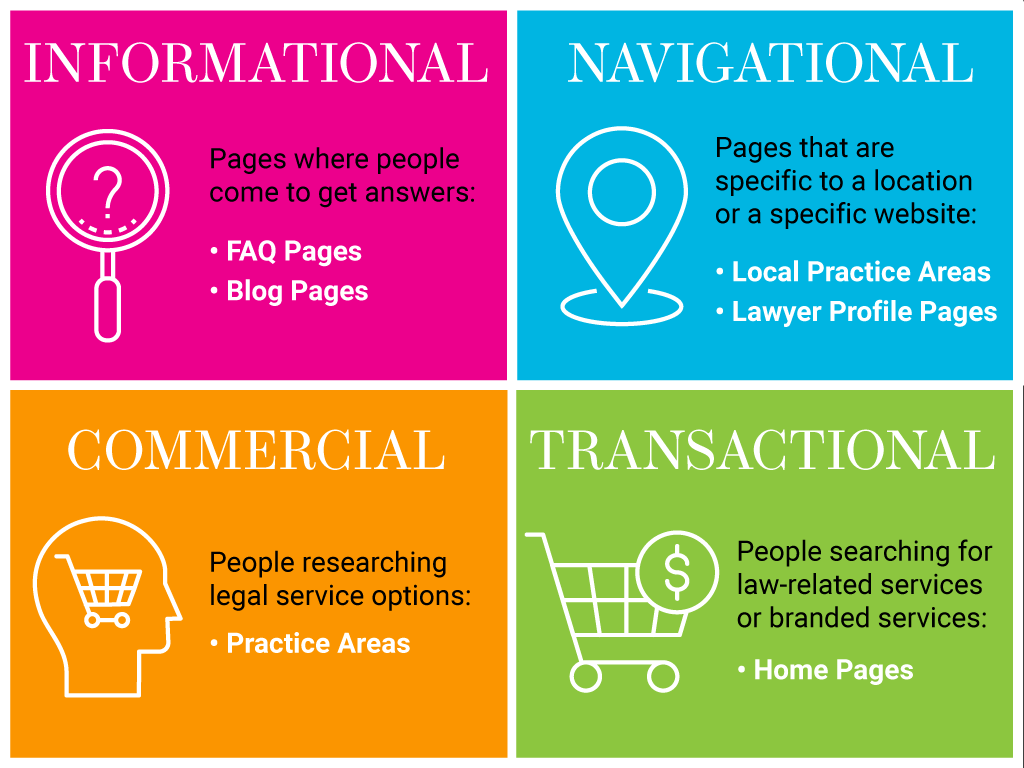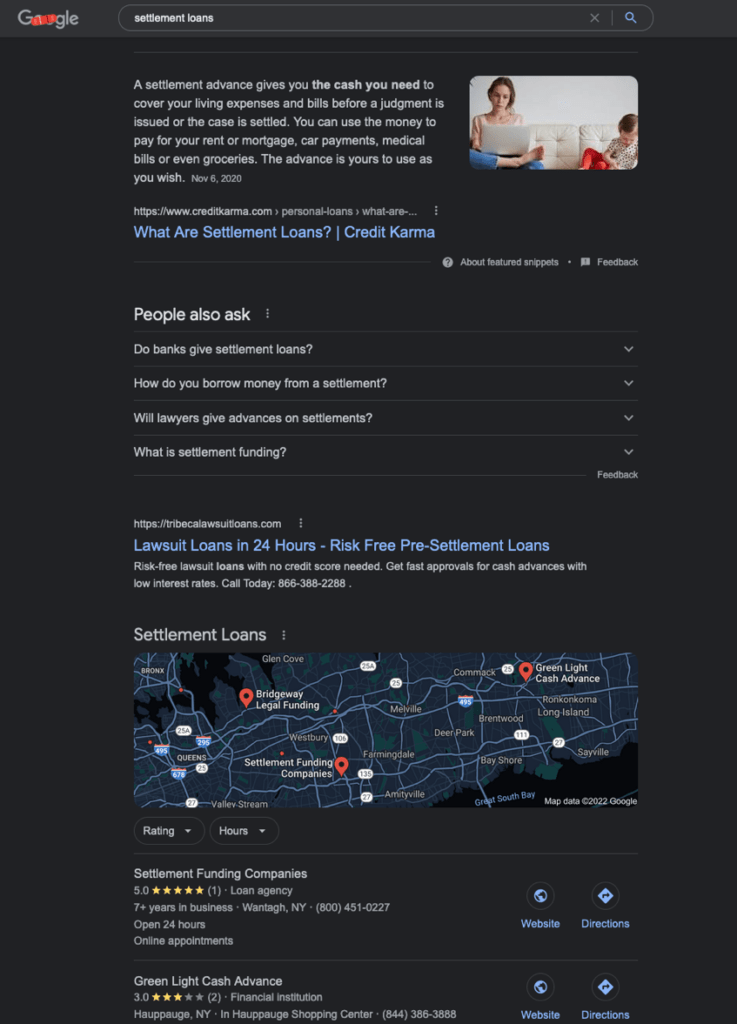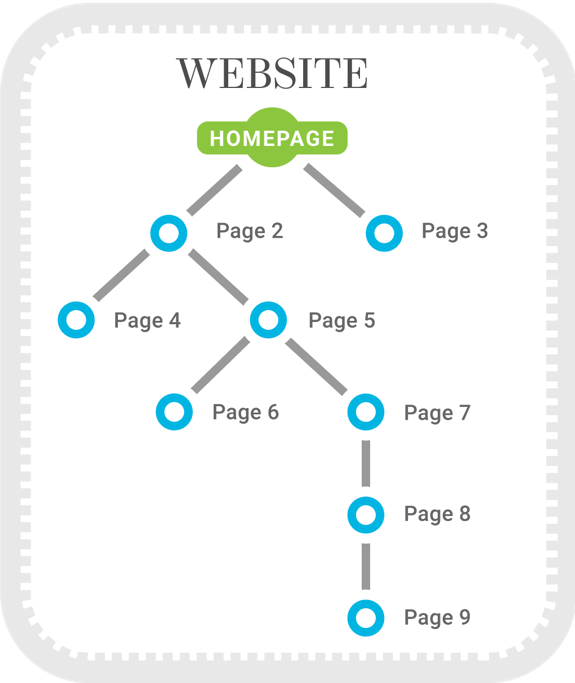Personal injury lawyers: are you targeting the right keywords?
Keywords are the bread and butter of any SEO strategy. When optimizing a website, we must first determine how users are searching for the products or services the website is offering.
One crucial step in any optimization plan that often gets missed is keyword mapping, or ensuring keywords are used in relevant content on pages designed to help users. Due to the highly competitive nature of the legal industry, keyword mapping for personal injury lawyers can be tricky.

What is keyword mapping?
Keyword mapping is the process of identifying which keyword each page of your website will target. It’s a complex undertaking that can evade or fix cannibalization issues, identify gaps in the content process, and assess existing content to determine whether it meets user intent.
One of the biggest challenges with keyword mapping is making sure to avoid keyword cannibalization, where various pages on a website are targeting the same keywords and competing for the same search results. We see this frequently in the legal industry, and keyword cannibalization can be solved with the right keyword mapping strategy.
Another benefit to creating a comprehensive and well-planned keyword map? Cannibalization becomes quick and easy to spot. Assessing existing website content and mapping keywords correctly will reveal if there are topics not yet covered or if the content on the website is mapped correctly to align with user intent.
When selecting keywords for a particular page, it’s important to look at the intent behind the search. Is the user looking for more information on a particular subject? If that’s the case, the best place to use these keywords would be the FAQ or blog section of a website. For practice area pages where you’re showcasing your services and adding compelling data to turn visitors into leads, keywords with a commercial and transactional intent are the most relevant ones.
However, as with anything in the SEO world, successful keyword mapping depends on other factors. Let’s explore keyword mapping according to the type of webpage we’re optimizing for the legal industry.
Steps for keyword success
The most important step in keyword mapping is to use search engine results to find what’s considered relevant and to determine how users are searching for services similar to yours. If your content differs from these results, you need to either update your content to become relevant or identify keywords that more closely align with your products or services.
Important questions to ask in any keyword mapping process:
- How is the page ranking currently?
- Is the content relevant to the query?
- Is information missing from my target landing page?
- Who is my competition ranking in the top 5 for this keyword?
First, do research to determine what the best keywords for personal injury lawyers are. See what your top competitors are ranking for and identify the keywords you need to map on your website on existing or new pages. Next, always do a Google search results page analysis. Can you map additional keywords on the same page?
Then determine whether the ranking page is informational or transactional. If what is currently ranking is different from what you want to write, always make sure to align with user intent.
One of the most counterintuitive examples for law firms is settlement loans. The user intent appears to be transactional, but when performing a Google search, we see that the main results are a definition of a settlement loans, making it an informational search.
Considerations for homepage keyword mapping
Current organic visibility is a great place to start when doing keyword mapping. One of the most important questions to ask about the home page is, “What is the website currently considered relevant for according to Google?”
To answer this question, you’ll need to use SEO-specific tools. Our go-tos are Semrush and Ahrefs. These tools will give you insight into what your homepage is relevant for in Google organic search.
In most cases, a law firm will have a physical location in one geographic area or market. In this scenario, the best place on a website to optimize for “personal injury lawyer + location” is the homepage.
(For more tips on keyword optimization, see how to optimize content for SEO.)
When going through the keyword mapping process, you need to make sure you’re selecting the best page for each search term you want to rank for. Although the homepage should be mapped for “personal injury lawyer + location,” you need to ask yourself some questions before committing to that plan.
Let’s explore some common keyword mapping scenarios we see in the legal industry.
Keyword visibility for your location
“Are there other pages that gain visibility for the same keyword?”
Imagine for the search term “personal injury lawyer Savannah,” our fake website imaginarylawfirm.com is ranking with several pages. https://www.imaginarylawfirm.com is on page 7 of Google search results while https://www.imaginarylawfirm.com/internal-landing-page is on page 3 of Google search results.
In this example, we would recommend mapping “personal injury lawyer Savannah” for the landing page and saving the homepage for branded keywords. We’d recommend avoiding the use of “personal injury lawyer Savannah” on the homepage.
Why?
The main reason is that Google is already flagging the landing page as more relevant for the search, giving it a higher chance of gaining organic visibility.
“Is my home page mapped for my main location?”
Another scenario might be that imaginarylawfirm.com is not ranking for “personal injury lawyer New Jersey,” but that’s where their office is located. In this situation, you need to do keyword research and update your homepage to target the most important location.
For law firms in multiple markets
“What if I’m a major law firm with physical locations in several states?”
In a situation where you aim for organic local visibility in multiple states, do not map the home page for a location because the backlinks will be for local keywords. This may impede your chances of ranking for other states where you are also licensed.
If you want to get leads all across a state, don’t limit your target to one city. In this scenario, make sure to not map keywords containing the name of a main city if you’re interested in state rankings.
“What happens when the homepage is mapped for “personal injury lawyer Los Angeles” and I want to be visible in local searches across California?”
Again, this is a case where you need to dig further into the existing data. If the homepage is currently ranking in the top 7 of page 1 of Google results for “personal injury lawyer Los Angeles,” do not change the keyword mapping. Our extensive experience in the legal niche and SEO in general has revealed that it will be hard to obtain ranking for another page.
If the homepage is not in the top 7 results, you can start new keyword research and expand your keyword list to map for the homepage.
The goal for the homepage should always be to have organic visibility for “personal injury lawyer” when the search is performed from surrounding ZIP codes or in localized keyword format, like “personal injury lawyer Los Angeles.”
Important tip: When checking localized results, make sure you’re performing the search from a local IP address. Searching for “personal injury lawyer” while in Los Angeles will return vastly different results from someone doing the same search from New York. If needed, you can use a virtual private network (VPN) to change your IP address to be in a different city.
Practice area pages and keyword mapping
Let’s start off with a very important PSA: Google ranks general searches like “personal injury lawyer” based on the searcher’s location, so you need to make sure you have dedicated landing pages for each geographic location.
As mentioned in the previous section, the IP address used to conduct a search is also closely tied to the search results you’ll get. Therefore, it’s critical that, when using rank tracking tools, you configure localized searches based on geographic location.
If you’re getting search visibility in various geographic locations, you need to make sure the right pages are ranking. For example, if you’re in Indianapolis and you also have a Carmel location, see if you need to map new pages for the new location or optimize existing locations. As with the homepage example, if your existing page is underperforming for Carmel-related keywords, you can map these keywords to a new page. If an existing page is already ranking for Carmel, you’re better off mapping the keywords to that page.
Semantic variation in keywords
A favorite concept among SEO experts is semantic variation. Google has gotten very good at understanding content, search intent, and linking concepts to topics. If you want to rank for “neck and back injury lawyer” for example, there’s no need to map two pages. You can map several injury-related searches on the same landing page.
Back to the law office in Carmel: how do you map the Carmel page? The same practice area page needs to be visible for people searching locally for “personal injury lawyer (ZIP codes surrounding Carmel)” and for searches where the location is included in the search. In this situation, make sure your page is using general search terms like “personal injury lawyer,” but also include the location: “personal injury lawyer Carmel.”
People search in different ways. Identify and map these variations for personal injury lawyer keywords. Include semantic variations such as “lawyer” and “attorney.” You also need to investigate other ways people might be searching for your practice area.
Instead of “personal injury lawyer,” which is very general, they might be looking for something more specific like “car wreck lawyer” or “truck accident attorney.” In this case, plan and map for “injury lawyer,” not just “personal injury.”
“Do I need an FAQ page, and what keywords should I map for it?”
Getting people to your website is great, but the end goal is the same for any law firm: get more leads and signed cases.
First off, make sure your website’s pages are mapped for terms related to claims and settlements and attract visitors who are looking for results. A great way to do that is an awesome FAQ (frequently asked questions) page. In most cases, FAQ pages are designed to explain a concept or to answer a popular question in a concise and relevant way.
If you don’t have an FAQ page yet, start with what you know. What are the things your clients are most likely to ask during a consultation? Your current client base should be the main source of questions for this page. Ask your team, get them involved in the process, and you’ll end up with helpful, relevant content catered to your user base.
Another great source for creating or enhancing an FAQ page? Google search. What are users asking? If you already have an FAQ page on your website, look at current organic visibility. See what those pages currently rank for using specialized tools like Ahrefs or Google Search Console.
Keyword mapping for blog pages
Your firm’s blog serves a specific purpose in your keyword mapping efforts. Blog pages are the most common place to address potential clients’ questions and concerns more in-depth. Whenever possible, use the blog section of your site to answer questions that cannot be addressed or summed up in the FAQ section.
A great example of a query you can map on the blog section is “social security disability appeal letter.” This is a purely informational query that should be mapped to a specific blog page.
After looking at all the different variables for successful keyword mapping, it’s important to note that, while search intent can be labeled and grouped into different types of searches, intent is more than a label. In our day-to-day activities, technical areas like keyword research, competitive analysis, and keyword mapping are aligned with our client’s business profile and priorities to drive results.
Personal injury lawyer keywords: a real-life scenario
In January 2021, one of our clients had a webpage where the content was about the Truvada lawsuit, but the page was mapped for “Truvada lawsuit lawyer.”
After analyzing the content on the page, we realized that it was a case of mapping incorrect keywords for the page. As a result, this client was ranking in position 58 in Google organic search for “Truvada lawsuit.”
The challenge was making sure the client had visibility for “Truvada lawsuit lawyer” as well as “Truvada lawsuit,” two keywords with very different intents, without causing keyword cannibalization. You never want two pages fighting over organic visibility for the same term.
Our strategy was to ensure the existing page that was mapped for “Truvada lawsuit lawyer” contained content that matched user intent. We then mapped the “Truvada lawsuit” keyword to a new page, thus creating relevant content for that query.
So what happened?
As a result, our client now ranks in position 1 on organic search for “Truvada lawsuit” and has two pages that are now mapped correctly. Looking at the data, we can clearly see there is no cannibalization issue.
This is just one case where keyword mapping is crucial in providing the right experience for clients’ organic visitors.
Keyword research tools will continue to evolve. We’re always getting new information to help us make data-driven decisions. But in the end, there is no “one-size-fits-all” approach to keyword mapping for personal injury lawyers. Strategy must always be customized according to each client’s goals, and it’s imperative to know the industry you’re working in for keyword mapping to be effective.
Combined with content marketing and technical SEO, keyword mapping is a powerful way to boost rankings and win at organic search.
Need help with keyword mapping?
We can do that. Contact us for a free 20-minute evaluation and let’s get started!






